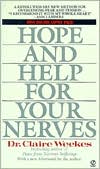It’s not unusual to have some physical symptom of stress, nervousness or anxiety. Even world class athletes have reported throwing up before a big match, and many seasoned performers and public speakers battle “stage fright” with sweaty, shaky hands. Nausea, vomiting, headaches, multiple trips to the bathroom are just a few physical manifestations.
In some people, though, those reactions appear in excess, or at the slightest trigger. Sometimes this overreaction or over-sensitization to stimuli occurs after a prolonged problem or illness when the sufferer is depleted or exhausted. Sometimes it  occurs as what Dr. Claire Weekes in her book Hope and Help For Your Nerves calls “second fear” — fear of the symptoms themselves, fear that they might crop up at just the wrong moment (which they then do), anxiety that they crop up with so little provocation.
occurs as what Dr. Claire Weekes in her book Hope and Help For Your Nerves calls “second fear” — fear of the symptoms themselves, fear that they might crop up at just the wrong moment (which they then do), anxiety that they crop up with so little provocation.
The first instinct or first advice, if you talk to someone else about it, is to fight against it. But fighting releases adrenalin, which heightens all those symptoms. And you can’t reason it away as an irrational fear of something that will likely not happen, because it has happened before, and at the worst times. As this over-sensitization continues, it sometimes grows and produces other problems.
A summary of Dr. Weekes advice would be to face and accept the fears, anxieties, and their physical symptoms rather than run from them, “float” past them rather than fight them, and be patient, letting enough time pass to change the conditioned responses of your mind and body to new ones. She explains all of these to greater degrees in her book and applies them to various scenarios.
If you’re prone to feel symptoms that you read about, you may want to skip parts of the book that deal with the escalation of symptoms and problems that a person experiences when these reactions go unchecked, lest you add fears of that happening to your other fears.
Though the book is not written from a Christian vantage point, it is not anti-Christian: Dr. Weekes acknowledges that “religion is a good friend” to those trying to recover from nervous illness. She doesn’t say this, but in my opinion Christians have an additional layer to deal with because they feel guilty: we think Christians shouldn’t have panic attacks, anxiety, or fear. In fact, I wrestled for a time with guilt over any kind of physical response to nervousness or fear, thinking I wasn’t exercising faith, until my pastor said something in a message to the effect that, if you are taking a walk and a dog starts chasing you, as you run to find a tree to climb with an angry dog nipping at your heels, you may fully trust that the Lord is with you and will help you deal with whatever happens, but your heart will still be racing. An over-reaction to the normal fears of life is a product of faulty thinking, and Christians are as prone to that as anyone else and in need to changing their thinking to right patterns. And sometimes the practical considerations need to be dealt with alongside or even before dealing with the spiritual issues. When Elijah fled, fearful and discouraged, from Jezebel in I Kings 19, the first thing the Lord did was to let him sleep, then send an angel to give him food and drink before dealing with the issue at hand. In Dr. Jim Berg’s Quieting a Noisy Soul series, he has a quick start section for those dealing with debilitating symptoms and who need immediate help. Of course, he deals with all of the things that disquiet the soul from a Biblical stance and in much more depth, and I hope that some day he will subdivide the series so that people can purchase the book, DVDs, etc. individually and more affordably rather than having to buy the whole kit when there will be parts of it they don’t use. But in the meantime he has a lot of excellent resources and helps on his site. I found Dr. Weekes’ book a helpful companion to Dr. Berg’s series. She does not advocate the Eastern religious types of meditation or other practices that would be cause for concern for the Christian.
I would not agree with every single point. For example, she advises that someone suffering extremely from these responses have companionship and not be left alone. But I have found that sometimes having to keep up with conversations and even someone else’s presence adds to the over-sensitization, and I can relax more fully when alone. I think one’s personality determines whether or not solitude is helpful or harmful. Overall, though, I found the book very helpful and practical.
(This review will be linked to Semicolon‘s Saturday Review of Books).

Great thoughts. I appreciated hearing your take on the topic as a whole. I’m with you – when I’m anxious (to an extreme) sometimes the best thing is to be totally alone. I can “get a grip” as they say when I’ve had down time to just be.
I do agree with you that Christians take on an added layer of guilt too. I know I do. I think I should be or feel a certain way. But I’m human. The benefit is just in knowing the best place – the best Person – to turn to.
Enjoyed this post very much!
I generally don’t stress even when I should. My Amoeba and my best friend sure could use the knowledge in this book, though!
Pingback: Friday’s Fave Five « Stray Thoughts
Pingback: Spring Reading Thing Wrap-Up « Stray Thoughts